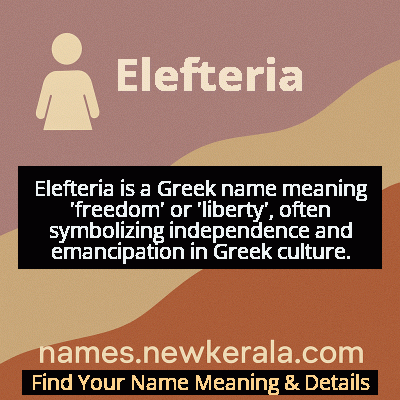Elefteria Name Meaning & Details
Origin, Popularity, Numerology Analysis & Name Meaning of Elefteria
Discover the origin, meaning, and cultural significance of the name ELEFTERIA. Delve into its historical roots and explore the lasting impact it has had on communities and traditions.
Name
Elefteria
Gender
Female
Origin
Greek
Lucky Number
9
Meaning of the Name - Elefteria
Elefteria is a Greek name meaning 'freedom' or 'liberty', often symbolizing independence and emancipation in Greek culture.
Elefteria - Complete Numerology Analysis
Your Numerology Number
Based on Pythagorean Numerology System
Ruling Planet
Mars
Positive Nature
Generous, passionate, energetic, and humanitarian.
Negative Traits
Impulsive, impatient, moody, and can be overly emotional.
Lucky Colours
Red, maroon, scarlet.
Lucky Days
Tuesday.
Lucky Stones
Red coral, garnet.
Harmony Numbers
1, 2, 3, 6.
Best Suited Professions
Military, sports, philanthropy, leadership roles.
What People Like About You
Courage, energy, leadership, generosity.
Famous People Named Elefteria
Eleftheria Arvanitaki
Singer
Internationally acclaimed Greek folk singer who brought Greek music to global audiences
Eleftheria Eleftheriou
Singer
Represented Greece in Eurovision 2012 and achieved international recognition
Eleftheria Kotzia
Classical Guitarist
Award-winning guitarist known for technical mastery and musical interpretation
Name Variations & International Equivalents
Click on blue names to explore their detailed meanings. Gray names with will be available soon.
Cultural & Historical Significance
The name's roots extend to ancient Greece, where Eleutheria was personified as a goddess of freedom. In classical Athens, the Festival of Eleutheria was celebrated to commemorate the city's liberation from tyranny. The philosophical concept of eleutheria was central to Greek thought, representing not just political freedom but also personal autonomy and the freedom to pursue excellence (arete). This dual meaning—both political and personal freedom—makes Elefteria a name rich with philosophical depth and cultural heritage.
In modern Greek consciousness, the name continues to resonate deeply, particularly during times of national challenge or celebration. It serves as a living connection to Greece's democratic origins and ongoing struggles for self-determination, making it more than just a personal name but a statement of cultural identity and historical memory.
Extended Personality Analysis
Women named Elefteria are often perceived as strong-willed, independent, and principled individuals. The name's meaning tends to influence personality expectations, with Elefterias typically displaying leadership qualities, self-reliance, and a natural aversion to constraints or limitations. They're often described as free spirits who value personal autonomy and have difficulty accepting authority without justification. This independence of thought frequently makes them innovative problem-solvers and trailblazers in their chosen fields.
Despite their strong independence, Elefterias typically possess deep loyalty to family and close friends. Their concept of freedom extends to respecting others' autonomy, making them supportive rather than controlling in relationships. Many display creative talents and intellectual curiosity, with a natural inclination toward philosophical or political interests. The name carries an expectation of moral courage—the willingness to stand up for principles even when unpopular. This combination of strength and compassion often makes Elefterias natural leaders who inspire others through both their convictions and their respect for individual differences.
In social contexts, Elefterias are often seen as authentic and straightforward, valuing honesty over social convenience. They tend to be lifelong learners, constantly seeking personal growth and new experiences that expand their understanding of the world. Their inherent need for freedom doesn't typically manifest as recklessness but rather as a thoughtful pursuit of meaningful self-direction and the courage to live according to their deepest values.
Modern Usage & Popularity
In contemporary Greece and Cypriot communities worldwide, Elefteria remains a meaningful though moderately used name. While not among the top 20 most popular names in recent years, it maintains steady usage particularly among families with strong patriotic sentiments or historical consciousness. According to Greek naming statistics, the name experiences periodic resurgences during significant national anniversaries or political movements emphasizing freedom and democracy. Among the Greek diaspora in countries like the United States, Australia, and Germany, Elefteria serves as a powerful cultural marker, helping second and third-generation immigrants maintain connection to Greek heritage and values. Modern nicknames including 'Elli,' 'Ria,' 'Effie,' or 'Ele' have made the formal name more accessible for daily use while preserving its significant meaning. The name has also gained some international recognition through famous bearers in music and arts, particularly Eleftheria Arvanitaki's global musical career, introducing non-Greek audiences to its cultural richness and philosophical depth.
Symbolic & Spiritual Meanings
Beyond its literal translation, Elefteria symbolizes liberation in multiple dimensions—political, personal, and spiritual. It represents the human aspiration for self-determination and the courage to resist oppression in all its forms. Metaphorically, the name embodies the universal journey from constraint to autonomy, making it symbolic of personal growth, emancipation from limiting circumstances, and the triumph of human spirit over adversity. In psychological terms, Elefteria represents the process of individuation—becoming one's authentic self free from external expectations or internal limitations that hinder personal fulfillment.
The name also carries profound spiritual connotations of enlightenment and liberation from ignorance or dogma. In Greek Orthodox tradition, while not officially a saint's name, the concept of eleutheria aligns perfectly with Christian ideals of freedom from sin and spiritual bondage. The symbolic weight of Elefteria makes it more than just a personal identifier—it becomes a statement of values, a declaration of the fundamental human right to determine one's own path and live according to one's conscience and capabilities. This multi-layered symbolism explains why the name continues to resonate across generations, representing both the collective memory of historical struggles for freedom and the individual's perpetual quest for personal authenticity and self-realization.

